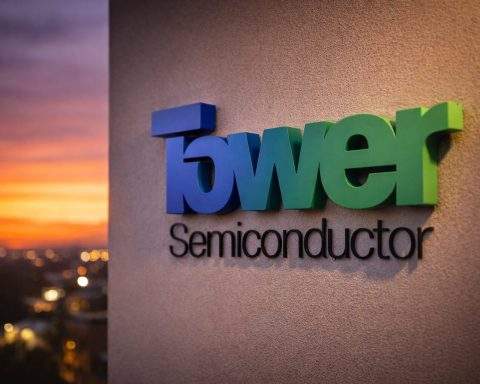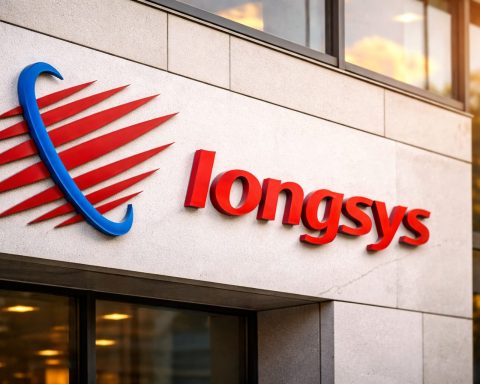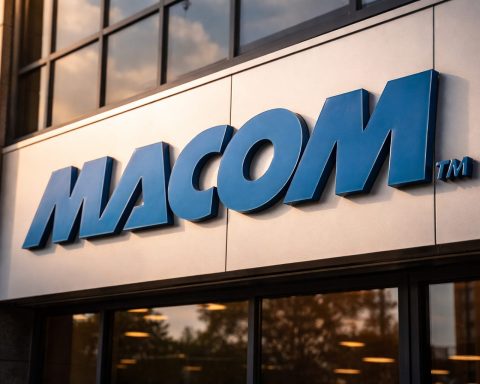- Broadcom soars on blockbuster AI order: Broadcom’s stock jumped about 15% after unveiling a $10 billion custom AI chip deal (widely believed to be with OpenAI), solidifying its role in Big Tech’s AI infrastructure reuters.com reuters.com. Nvidia and AMD shares fell ~2–5% as investors weighed the shift toward in-house AI chips 1 .
- Amazon’s secret AI project boosts shares: Amazon stock surged ~4% amid reports the company is testing a new AI-powered “Quick Suite” workplace tool, signaling a major push into enterprise AI software home.saxo 2 .
- Salesforce slumps on AI growing pains: Salesforce shares tumbled nearly 8% after a soft revenue forecast hinted at delayed returns from its hefty AI investments reuters.com. Analysts warned the “uninspiring” outlook gives “bears fresh ammo” to question if incumbents can fully monetize AI 3 .
- C3.ai falters despite AI hype: Enterprise AI pure-play C3.ai reported a 19% year-over-year drop in quarterly revenue and missed its guidance, triggering a double-digit stock plunge nasdaq.com. Management blamed internal sales execution issues rather than AI demand, and a new CEO was appointed to reignite growth 4 .
- Anthropic settles landmark AI lawsuit: Startup Anthropic agreed to pay $1.5 billion to settle authors’ claims it used pirated books to train its chatbot Claude reuters.com. Plaintiffs called it the “largest copyright recovery in history” and a warning to AI firms exploiting copyrighted data 5 .
- Global AI stocks mixed: U.S. tech indexes hit new highs as investors rotated back into AI plays, bolstered by Fed rate-cut bets home.saxo. Europe’s tech sector gained (chipmaker ASML +3.5% home.saxo), while some overheated Chinese AI names pulled back after a 10% August surge amid signs of tighter trading curbs 6 .
- Investors divided on AI’s future: Bank of America analysts cheered Broadcom’s win, noting the AI “pie could just be getting bigger” reuters.com. But Goldman Sachs cautioned that if Big Tech’s AI spending cools, S&P 500 valuations could drop 15–20% as lofty AI expectations meet a demand for real profits growthshuttle.com 7 .
Market Overview: AI Momentum Rebounds
After a late-summer lull, AI-related stocks roared back at week’s end. Weaker U.S. jobs data fueled expectations of a Federal Reserve rate cut, sparking a rally in high-growth tech names home.saxo. The S&P 500 and Nasdaq each rose roughly 0.8–0.9% on Thursday, with the Nasdaq touching record territory behind renewed enthusiasm for AI-driven companies home.saxo. Investor sentiment toward AI had wavered in August, but fresh catalysts – from blockbuster chip deals to optimistic product news – helped restore confidence in the “AI trade.” European markets echoed the optimism, as the STOXX 600 climbed 0.6% and chip-equipment giant ASML jumped 3.5% on the day home.saxo. In Asia, however, the picture was more mixed: Hong Kong’s Hang Seng Tech index fell ~1.9% Thursday as Chinese AI stocks like Cambricon and Horizon Robotics dipped on profit-taking and regulatory jitters after surging in August home.saxo. Overall, the AI sector’s narrative this week was one of resilience – even as analysts debate how long the hype can outrun hard fundamentals.
Chipmakers & Hardware: Broadcom’s $10B OpenAI Deal Shakes the Sector
Broadcom (AVGO) delivered the week’s biggest bombshell, announcing it secured an enormous $10 billion order for custom AI chips from a mystery new customer reuters.com. Analysts widely believe that customer is OpenAI, which would mark OpenAI’s pivot toward designing its own AI acceleration hardware in partnership with Broadcom reuters.com. The news sent Broadcom’s stock rocketing 15% higher on Friday, adding over $200 billion to its market cap and underscoring the company’s evolution into a key enabler of generative AI infrastructure reuters.com. “While we agree Broadcom is taking more share, we believe the AI pie could just be getting bigger,” Bank of America remarked, suggesting this mega-deal reinforces confidence that the overall AI silicon market is still expanding 8 .
The flip side was felt by Nvidia (NVDA) and AMD, whose stocks slipped ~2% and 5% respectively on concerns that cloud giants are diversifying away from off-the-shelf GPUs reuters.com. OpenAI has until now relied heavily on Nvidia’s GPUs to power ChatGPT, so a shift to in-house chips (and to Broadcom as a supplier) implies future orders Nvidia might not secure reuters.com. It’s part of a broader trend: hyperscalers like Amazon, Microsoft, and Meta are all developing proprietary AI chips to lower costs and reduce reliance on Nvidia’s cutting-edge but expensive processors reuters.com. Still, Nvidia remains a powerhouse – its stock is up over tenfold since early 2023’s AI boom – and some bulls argue demand for Nvidia’s AI platforms will stay strong even as custom silicon options grow 9 .
Broadcom’s blockbuster announcement coincided with its earnings report, which beat expectations and came with upbeat guidance home.saxo. CEO Hock Tan further thrilled investors by confirming he will remain at the helm for at least five more years, ensuring steady leadership through the AI boom reuters.com. Wall Street quickly boosted targets: JPMorgan raised Broadcom’s price target to $400 (from $325), citing “strong AI-driven momentum” and the significance of landing a $10B client win stocktwits.com. All told, chipmakers dominated headlines – not only for their current earnings, but for how they’re positioning for the next chapter of AI. With generative AI’s compute demands surging, winners will be those who secure the biggest deals with AI heavyweights. This week, Broadcom seized that crown, at least for now.
Big Tech’s AI Initiatives: Amazon’s ‘Quick Suite’ and More
Among mega-cap tech players, Amazon.com (AMZN) made waves with a glimpse into its next big AI move. Internal documents leaked to the press revealed Amazon is testing a new “agentic” AI software suite – codenamed Quick Suite – that aims to bring AI copilots and autonomous agents into the workplace businessinsider.com. The tool will let enterprise customers design custom AI agents for business tasks, integrating data analysis (via Amazon’s QuickSight) and automation workflows in a unified platform businessinsider.com businessinsider.com. Essentially, Amazon is looking to leverage its AWS cloud dominance to crack into the lucrative enterprise software market dominated by the likes of Microsoft and Salesforce. Early testers of Quick Suite reportedly include BMW, Intuit, and Koch Industries businessinsider.com, indicating Amazon’s solution is being trialed across industries. This development re-ignited investor excitement—Amazon’s stock popped 4.3% on Thursday on “AI optimism” as traders bet Amazon could open a major new revenue stream in enterprise AI services home.saxo. It also puts Amazon in direct competition with Microsoft’s Azure AI offerings and Google’s workplace AI tools, adding a new front in Big Tech’s AI arms race.
Other giants also stayed in the AI spotlight. Alphabet (GOOGL), Google’s parent, saw its shares hit a fresh peak earlier in the week after dodging a potential breakup in a U.S. antitrust case reuters.com – a relief that allows Google to keep pouring resources into AI without structural distractions. Google has been aggressively deploying AI across its products and cloud services, and even as it faces stiff competition, investors appear encouraged by its relative value and legal clarity. Microsoft (MSFT), meanwhile, continues to benefit from its close partnership with OpenAI (it’s an investor and cloud host for OpenAI) and is developing its own AI chips (Project Athena) to fuel services like Azure and Copilot. Though Microsoft had no singular “AI news” item this week, its stock remains near all-time highs, reflecting optimism around its AI-driven growth in cloud and enterprise software. Meta Platforms (META) similarly traded higher this week, buoyed by the general tech rally and its own AI advancements – from open-sourcing AI models to integrating AI features across Facebook, Instagram, and its new Quest 3 headset. In short, Big Tech’s AI bets are firing on all cylinders: whether through new products (Amazon’s Quick Suite), continued R&D (custom chips, generative AI features), or simply riding the broader AI wave, these companies reinforced their central role in the AI economy’s next phase.
Enterprise AI Software: Salesforce’s Setback and Palantir’s Push
Not all AI news was rosy – Salesforce (CRM) provided a reality check that even the biggest enterprise software firms face challenges converting AI buzz into bucks. The cloud CRM leader delivered solid quarterly results, but its third-quarter revenue forecast came in just below analysts’ estimates, sending its stock down almost 8% on Thursday reuters.com reuters.com. Salesforce attributed the cautious outlook to customers becoming more measured in spending despite the AI “revolution” the company has hyped. Over the past year, Salesforce has infused AI across its product suite – from Einstein GPT features to the 2024 launch of “Agentforce,” an AI agent platform to automate workflows reuters.com. However, the payoff from these innovations may take longer than investors hoped. “The outlook is giving bears fresh ammo amid mounting fears that the software sector is ripe for disruption and questions over whether incumbents can fully monetize AI,” observed Matt Britzman of Hargreaves Lansdown reuters.com. In other words, there’s skepticism about whether enterprise software giants like Salesforce can convert AI investments into hefty near-term returns, especially as economic uncertainty makes clients cautious. Salesforce tried to offset the disappointment by expanding its stock buyback program by $20 billion, but that failed to spur confidence reuters.com. Analysts at Oppenheimer bluntly called Salesforce’s growth outlook “uninspiring,” noting a tough environment for big front-office software providers this year reuters.com. The stock is now down ~24% in 2025 to date reuters.com, illustrating how enthusiasm for AI hasn’t immunized it from broader concerns. Salesforce’s response has been to seek growth via acquisitions (it bought data management firm Informatica for $8B in May) and to double down on efficiency, but clearly Wall Street wants to see more tangible AI-driven revenue acceleration.
In contrast, Palantir Technologies (PLTR) – often viewed as a rising star of enterprise AI – seized the moment to trumpet new deals. The data analytics and AI platform provider announced a five-year expansion of its partnership with Lear Corp (an automotive supplier) and a new collaboration with Lumen Technologies (a telecom network provider) to implement Palantir’s AI solutions stocktwits.com. Under the Lumen deal, Palantir’s Foundry and AIP (Artificial Intelligence Platform) software will help automate and optimize Lumen’s operations, with Lumen’s CTO saying the partnership “allows us to harness AI to accelerate our modernization efforts” in the network services they deliver stocktwits.com. The expanded Lear agreement will see Palantir’s platforms further integrated across Lear’s manufacturing processes globally, building on successes that reportedly saved Lear $30 million in the first half of 2025 through AI-driven efficiency gains businesswire.com businesswire.com. These wins reinforce Palantir’s positioning as a go-to provider for enterprise AI implementation, helping traditional companies become data-driven “AI-powered” businesses. Interestingly, despite the positive news, Palantir’s stock was roughly flat to slightly down (~–1%) on Friday stocktwits.com. The lukewarm reaction suggests its shares have already run up significantly (Palantir has doubled in 2025 and is +400% year-on-year stocktwits.com) and investors may be in “wait-and-see” mode for how these partnerships translate into revenue. Still, many analysts remain bullish on Palantir’s long-term prospects – Wedbush’s Dan Ives recently argued Palantir’s AI platform could drive such growth that the company “has the potential to turn into a trillion-dollar business within two to three years,” a highly ambitious call stocktwits.com. While that forecast may be optimistic, Palantir’s latest moves show it’s aggressively capitalizing on the enterprise AI trend even as older guard firms like Salesforce navigate a slower payoff. The enterprise AI software space is clearly dynamic: new entrants and legacy players alike are racing to convince customers (and investors) that their AI offerings can deliver real value and ROI.
AI Pure-Plays and Smaller Players: Hype vs. Reality
Beyond the tech titans, several pure-play AI companies and smaller cap names revealed the stark divide between hype and reality. C3.ai (NYSE: AI) – which rode the AI stock frenzy earlier this year due to its very ticker symbol – had a brutal week. The company announced fiscal Q1 2026 results (for the quarter ended July) that showed revenue fell 19% year-over-year to $70.3 million nasdaq.com, badly missing analysts’ expectations. It was C3.ai’s first-ever revenue guidance miss since going public, and management didn’t sugarcoat the cause: Executive Chairman Tom Siebel admitted the shortfall was “completely unacceptable…It boiled down to poor sales execution and poor resource coordination” internally nasdaq.com. In other words, C3.ai’s issues were self-inflicted, not due to a lack of market demand for AI solutions. Still, the dismal results underscored how challenging it can be for newer AI software firms to convert enthusiasm into sales. C3.ai swiftly shook up its leadership – naming a new CEO, bringing in a chief commercial officer, and restructuring its sales teams – to try to get growth back on track nasdaq.com nasdaq.com. But investors weren’t waiting around: the stock plunged about 15% in the days around the earnings release, as confidence eroded in C3’s ability to capitalize on the AI boom. The company’s shares have round-tripped from meme-stock highs earlier in the year, reflecting a broader theme: not every “AI stock” will be a winner, and even in a booming sector, execution matters immensely.
Other AI-oriented names had more positive storylines. Aehr Test Systems (AEHR), a small-cap maker of testing equipment for semiconductors (including chips used in AI), reported strong demand and saw its stock near 52-week highs as investors anticipate AI chip production needs will benefit tool suppliers. SoundHound AI (SOUN), a voice-AI software firm, announced new partnerships to integrate its voice assistant tech into smart devices, giving a modest bump to its shares. And UiPath (PATH), a leader in robotic process automation, delivered earnings that beat expectations as it integrates AI features into its automation platform, indicating that adding AI capabilities can bolster even mid-sized enterprise software players. These moves didn’t grab headlines like Broadcom or Salesforce, but they show the broader AI ecosystem has many players riding the wave – from chip testers to niche software to data cloud providers (Snowflake, for instance, got attention after touting rising interest in its AI/ML offerings). The key for these smaller companies will be proving they can find a sustainable, profitable niche in the AI value chain before the incumbents or larger competitors encroach. This week highlighted both sides: enormous opportunity in AI and significant risk for those that stumble.
Legal and Regulatory: $1.5B Copyright Settlement Signals New Era
As AI companies push forward, they are also starting to grapple with legal and regulatory challenges of this technology’s breakneck rise. In a landmark development, Anthropic, a leading AI startup (and maker of the Claude chatbot), told a federal judge that it will pay $1.5 billion to settle a class-action lawsuit brought by a group of fiction authors reuters.com. The authors accused Anthropic of scraping hundreds of thousands of books from the internet and using that text to train its AI models without permission – effectively “data laundering” their copyrighted works. The proposed settlement, if approved, would be the largest publicly reported copyright recovery ever, according to the plaintiffs reuters.com reuters.com. “This settlement sends a powerful message to AI companies and creators alike that taking copyrighted works from these pirate websites is wrong,” the authors’ lawyers said in a statement, framing the payout as a precedent-setting victory reuters.com. Under the deal, Anthropic would destroy all the illicit book data it obtained and could still face claims if its AI outputs significantly copy from those texts 10 .
This case is just the tip of the iceberg in a growing collision between generative AI and intellectual property law. Similar lawsuits are pending against OpenAI, Microsoft, Meta and others for using copyrighted content (books, code, images) to train AI without compensation reuters.com. The Anthropic settlement – enormous for a startup – may pressure others to seek their own settlements or licensing arrangements, or risk multi-billion-dollar liabilities. It also kicks off a broader debate over fair use: are AI training practices protected, or do creators deserve a cut when their material helps produce AI models worth billions? Regulators are closely watching these issues. In the EU, negotiations over the AI Act include provisions about data transparency that could affect training set disclosures. In the U.S., lawmakers have held hearings on AI and copyright, and the White House has convened AI companies (including Anthropic, OpenAI, Google, Amazon and Meta) to agree on AI safety and transparency commitments. This week’s developments indicate the AI industry is entering a new phase of accountability. Legal settlements like Anthropic’s and potential new regulations mean AI firms must balance innovation with compliance and ethical considerations – costs that investors in AI companies will have to factor in going forward.
Analyst Insights & Investor Sentiment
The tumult of the week left analysts and market strategists divided on what comes next for AI-related stocks. On one hand, optimists point to news like Broadcom’s massive order as proof that the AI revolution is still in its early innings. The fact that a single AI customer can generate a $10 billion hardware deal suggests “generative AI at scale” is becoming a reality, which could lift many boats. “The AI hype cycle has substance beneath it – demand for AI infrastructure is accelerating,” argued one upbeat fund manager on CNBC, who noted that enterprise and government spending on AI projects continues to ramp despite macroeconomic headwinds. Indeed, the so-called “hyperscalers” (Amazon, Microsoft, Alphabet, Meta, Oracle, etc.) are forecast to spend an astonishing $300–$350 billion on AI and data-center capex in 2025 alone finance.yahoo.com. Bulls believe these investments will unlock new productivity and profit streams, justifying the rich valuations for top AI beneficiaries. Bank of America’s team echoed this sentiment in the context of Broadcom, suggesting the overall AI opportunity is expanding such that even new entrants (like Broadcom in AI accelerators) can thrive without simply cannibalizing incumbents 8 .
On the other hand, a chorus of more cautious voices is growing louder. Goldman Sachs this week issued a note warning that an “inevitable slowdown” in Big Tech’s torrid AI spending could have painful consequences for the broader market growthshuttle.com. Strategist Ryan Hammond of Goldman observed that the current phase – where companies pour billions into AI initiatives – will eventually give way to a phase where investors demand to see tangible financial returns growthshuttle.com growthshuttle.com. If those returns don’t materialize fast enough, or if companies decide to rein in capital expenditures, the high valuations on AI-linked stocks could face a reality check. Goldman estimated that if AI capex growth reverted sharply (say, back to 2022 levels), it might wipe out 30% of projected S&P 500 sales growth for 2026 and compress market-wide valuation multiples by 15–20% growthshuttle.com growthshuttle.com. In practical terms, that could spell a significant market pullback. Recent stumbles like Nvidia’s stock dipping 6% after its own tempered growth forecast and Salesforce’s slide on AI delays were pointed out as signs that “euphoria is beginning to show cracks” growthshuttle.com. The message: while AI remains a powerful growth narrative, investors are becoming more discriminating, rewarding concrete results (e.g. actual earnings beats or major deals) and punishing mere hype or slow payoffs.
For now, the AI investing boom is intact – major indexes are at highs, and flows into AI-themed funds remain robust. But this week highlighted that the market is starting to sort winners from losers. Companies delivering on bold AI promises (Broadcom’s sales, Palantir’s partnerships) enjoyed praise, whereas those asking for patience (Salesforce, C3.ai) met skepticism. As one market columnist quipped, “The easy part of the AI trade – just buying anything with AI in its name – might be over. Now the real work begins in separating real value from vapor.” Going forward, look for volatility to persist in AI stocks, with news of each earnings report, product launch, or regulatory action causing outsized swings. The long-term believers insist we are only scratching the surface of AI’s economic potential. The skeptics counter that current prices bake in perfection and that a reality check is due. This week’s roundup of news – from triumphs and new products to cautionary tales and legal reckonings – shows that both sides have plenty of evidence. Investors will need to stay nimble and informed as the AI saga continues to unfold on the markets.
Sources: Official corporate press releases and filings; Reuters reuters.com reuters.com reuters.com and Dow Jones market news; Yahoo Finance and CNBC summaries; Business Insider exclusive report businessinsider.com; Stocktwits Newswire stocktwits.com stocktwits.com; Goldman Sachs research commentary growthshuttle.com 7 .






